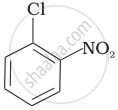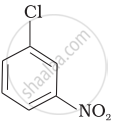Advertisements
Advertisements
प्रश्न
Chlorobenzene is extremely less reactive towards a nucleophilic substitution reaction. Give two reasons for the same.
उत्तर
Chlorobenzene is extremely less reactive towards a nucleophilic substitution reaction because of the following reasons:
(1) Resonance effect: The electron pair on chlorine atom is in conjugation with the π - electrons of the benzene ring which results in the following resonance structures:

-
This results in delocalization of the electrons of C − Cl bond and a partial double bond character develops in the bond, which makes it difficult for the nucleophile to cleave the C − Cl bond.
(2) The nucleophile suffers repulsion from the increased electron density on the benzene ring as a result the nucleophile is unable to make a close approach for the attack on the molecule.
APPEARS IN
संबंधित प्रश्न
What happens when \[\ce{CH3 - Br}\] is treated with KCN?
Write the final product(s) in each of the following reactions:

Write the product formed on reaction of D-glucose with Br2 water.
Write chemical equation in support of your answer.
Out of  Cl and
Cl and  CH2- Cl, which one is more reactive towards nucleophilic substitution reaction and why?
CH2- Cl, which one is more reactive towards nucleophilic substitution reaction and why?
Out of (CH3)3 C-Br and (CH3)3 C-I, which one is more reactive towards SN1 and why?
Which of the following compounds will give racemic mixture on nucleophilic substitution by \[\ce{OH-}\] ion?
(a) \[\begin{array}{cc}
\phantom{}\ce{CH3 - CH - Br}\\
\phantom{}|\\
\phantom{....}\ce{C2H5}\phantom{}
\end{array}\]
(b) \[\begin{array}{cc}
\phantom{..}\ce{Br}\\
\phantom{}|\\
\phantom{}\ce{CH3 - C - CH3}\\
\phantom{}|\\
\phantom{....}\ce{C2H5}\phantom{}
\end{array}\]
(c) \[\begin{array}{cc}
\phantom{....}\ce{CH3 - CH - CH2Br}\\
\phantom{}|\\
\phantom{....}\ce{C2H5}\phantom{}
\end{array}\]
Arrange the following compounds in increasing order of rate of reaction towards nucleophilic substitution.
| (a) |  |
| (b) |  |
| (c) |  |
Allyl chloride is hydrolysed more readily than n-propyl chloride. Why?
Assertion: Chlorobenzene is resistant to nucleophilic substitution reaction at room temperature.
Reason (R): C–Cl bond gets weaker due, to resonance.
Why haloarenes are not reactive towards nucleophilic substitution reaction? Give two reactions.
